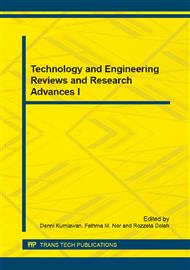p.177
p.182
p.186
p.190
p.195
p.200
p.205
p.210
p.215
Application of Adaptive Network-Based Fuzzy Inference System (ANFIS) for River Stage Prediction in a Tropical Catchment
Abstract:
Computational intelligence (CI) tools have been successfully applied in different fields with superior performances. Neuro-fuzzy system (NFS) is one the approach which combines the benefits of two powerful CI tools known as artificial neural networks (ANN) and fuzzy logic. Although NFS has attracted researchers in many areas of study, few of its applications have been undertaken in hydrological modeling. Adaptive Network-based Fuzzy Inference System (ANFIS) is so far the most established NFS technique and this study is an application of ANFIS in river stage prediction by using rainfall and stage antecedents as inputs in the tropical catchment of Bekok River in Malaysia. To evaluate the performance of the ANFIS model, it was compared with a traditional modeling technique known as autoregressive model with exogenous inputs (ARX). The results of this study were evaluated based on several statistical measures such as coefficient of efficiency (CE), coefficient of determination (r2), Root Mean Square Error (RMSE), and Mean Absolute Error (MAE). The results showed that ANFIS can successfully predict the river stage and it outperforms ARX model significantly. ANFIS was also found better in estimating peak river stages comparing to ARX model. This study demonstrates the auspicious potential of ANFIS in river stage modeling.
Info:
Periodical:
Pages:
195-199
DOI:
Citation:
Online since:
February 2015
Authors:
Keywords:
Price:
Сopyright:
© 2015 Trans Tech Publications Ltd. All Rights Reserved
Share:
Citation:


